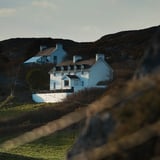| | | Why Dan Levy Won't Celebrate Canada Day: "I Was Re-educated on My Place as a Canadian Settler" | | by Chanel Vargas Jul 2, 2021 | 
Image Source: Getty / Taylor Hill On May 29, the remains of 215 Indigenous children were found at Kamloops Indian Residential School in British Columbia. Last week, Cowessess First Nation uncovered 751 additional unmarked graves, most of which are also believed to belong to indigenous children, at Marieval Indian Residential School in Saskatchewan. More than 150,000 indigenous children were forcibly removed from their homes from the early 1800s up until the 1990s to attend these "residential schools." Once they were in the institutions, the children were given new names, forbidden from speaking their native languages, and made to convert to Christianity. The discovery of these unmarked graves paints a dark and long-concealed picture of Canada's history of abuses against the country's indigenous populations. "I encourage all Canadian settlers, myself included, to not celebrate Canada Day, but rather re-educate yourselves on the real history of Canada by taking this course." In an effort to encourage Canadian residents to educate themselves on their country's history this July 1, aka Canada Day, Dan Levy shared his experience taking part in a virtual Indigenous studies course taught by the faculty of native studies at the University of Alberta last summer. "Over 12 weeks, I was re-educated on the history of Canada," he said in a video on Instagram on Thursday. "I was re-educated on my place as a Canadian settler, my context, my privilege. And this Canada Day, with everything unfolding in the news, I encourage all Canadian settlers, myself included, to not celebrate Canada Day, but rather re-educate yourselves on the real history of Canada by taking this course." The 12-week class, currently taught by Dr. Tracy Bear and Dr. Paul Gareau, explores both Indigenous histories and Canada's contemporary issues that Indigenous people face, with a focus on "national and local Indigenous-settler relations." "Topics for the 12 lessons include the fur trade and other exchange relationships, land claims and environmental impacts, legal systems and rights, political conflicts and alliances, Indigenous political activism, and contemporary Indigenous life, art and its expressions," the website reads. For Dan, the class was an opportunity to engage in "meaningful, insightful, and transformational conversations about the lessons of the week." "I highly, highly, highly encourage all Canadian settlers to take this course to better understand your place within the country, to better understand your privilege, and to, hopefully, strengthen your ties of allyship and advocacy," he urged. "Education is the key to being of better service to people." In an interview with The Guardian, Sol Mamakwa, a lawmaker from Kingfisher Lake First Nation, said Canada Day should be seen as a day of mourning for all those children who never made it home, not a day of celebration. "I don't think people really understand how much Indigenous people were forced to pay to this country," he said. "Our spirituality was taken away. Our way of life, our languages and our families were taken away. With the remains we continue to find, people are beginning to see that Indigenous people paid in full - with their lives." Watch Dan's full video below, and enroll for free in the Indigenous Canada course, which is subtitled in nine different languages, here. | | | | | | | A Murder in West Cork: What Happened to Sophie Toscan du Plantier's Holiday Home? | | by Stacey Nguyen Jul 2, 2021 | 
Netflix's Sophie: A Murder in West Cork follows the tragic death of a French television producer named Sophie Toscan du Plantier. The 39-year-old was found brutally murdered outside her holiday home in West Cork, Ireland, in 1996. While Ian Bailey, a local journalist during the time of the murder, remains the sole suspect in the investigation, the true-crime case is still legally unresolved. Now that it's been over two decades since her death, what happened to Toscan du Plantier's holiday home? The cottage still stands in Ireland, and Toscan du Plantier's son, Pierre Louis Baudey-Vignaud, continues to visit it as he works on his mother's case. As we learn in the docuseries, Toscan du Plantier worked as a film producer in France, where she often crossed paths with the French elite. In order to get away from the hustle and bustle of that life, she found a remote cottage in the coastal village of Schull. But on Dec. 23, 1996, Toscan du Plantier was found dead with severe head injuries outside her peaceful retreat, just days after she arrived in Ireland on holiday. According to The Irish Times, a cross currently marks where Toscan du Plantier's body was found. The story of her death has haunted Schull, which was otherwise known for its welcoming attitude toward people from all walks of life. Locals have had to deal with the morbid fascination over the home as the case has stretched on over the last 25 years. "We had people bringing their grannies and their small children to look at the cross marking where Sophie was found, and then some of them were cheeky enough to drive up to the house and peer in the windows," Shirley Foster, Toscan du Plantier's former neighbor who found her body, told The Irish Times. To this day, Baudey-Vignaud, Toscan du Plantier's only son, makes frequent visits to the holiday home, as it reminds him of his mother. "The house in Ireland, for me, is the only place where I would go with my mother and where I still go today," Baudey-Vignaud explained in the docuseries. "It's like going to see her. It's like going to stay with her every time. My mother is very present in this house." | | | | | | | Alyson Stoner Shares Painful Memories of Conversion Therapy: "I Felt Stuck. I Felt Wretched." | | by Chanel Vargas Jul 2, 2021 | 
Image Source: Getty / Emma McIntyre Trigger warning: The following story contains mentions of conversion therapy, religious shame, and suicidal ideation. Pride Month is a celebration, but it's also a reminder that there's still substantial work to be done before all members of the LGBTQ+ community feel fully safe and accepted. In an interview published on June 30, Alyson Stoner detailed her experience undergoing gay "conversion therapy," or "reparative therapy," the practice of targeting LGBTQ+ youth with the goal of changing their sexual or gender identities. The painful experience came at a time when Alyson was struggling deeply with her sexuality and had fallen in love with a woman for the first time, a pivotal moment that clashed dangerously with her religious upbringing. "I see the body as something that is shameful, that is not to be trusted. It actually ends up messing with my ability to foster genuine relationships with others and myself." "I felt stuck. I felt wretched. I felt like everything was wrong with me, even though I, in my heart of hearts, only desired to be a devoted follower of God," the Mind Body Pride author told Insider of her experience with conversion therapy, a practice that is currently banned in 20 US states. "So to hear from people you trust, from people you respect, from people you might even aspire to become, that you at your core are 'rotten,' 'abominable' . . . it just sends you into a spiral - at least for me, because I just wanted to do the right thing." Pressured by her family's religious ideology, Alyson admitted herself to an "outpatient variation" of conversion therapy, a memory that is still too devastating to fully recall. "My mind doesn't want to even go there," she said. "My legs started shaking at the thought of reliving some of it. I know firsthand how dangerous it is for me as someone who had access to therapy and other forms of support. And I still was considering whether my life was worth living, or, if everything was wrong with me, then what good was it for me to be around, starting to see myself as someone who only brought harm to other people, to society." Alyson added that there are mental and emotional scars that do not fade away from the experience, making it difficult for her to recount specific details from the heartbreaking chapter in her life. "It severs the mind-body connection because I see the body as something that is shameful, that is not to be trusted," she said. "It actually ends up messing with my ability to foster genuine relationships with others and myself, because now I'm suppressing a voice. I'm trying to change something that is, what I now understand, very natural." In a personal essay for Teen Vogue in 2018, Alyson, who is pansexual, reflected on the detrimental effects of her religious upbringing on her mental health and her journey to accepting herself, adding that, after much reflection, she is finally able to live her truth openly. "I, Alyson, am attracted to men, women and people who identify in other ways," she wrote. "I can love people of every gender identity and expression. It is the soul that captivates me. It is the love we can build and the goodness we can contribute to the world by supporting each other's best journeys." | | | | | Trust Me, Zola Might Just Be the Wittiest and Wildest Movie of 2021 | | by Grayson Gilcrease Jul 2, 2021 | 
If you don't already have plans to see Zola, this is your sign to make some. Based on the infamous 148-tweet thread, the film follows a Detroit waitress as she gets swept up in what becomes one of the wildest moments of her life thanks to a sex worker named Stefani and her pimp/"roommate," X. It also features Taylour Paige (Zola), Riley Keough (Stefani), Nicholas Braun (Derrek), and Colman Domingo (X) in some of the best work of their careers. While I was ready for a wild ride, I wasn't ready for a film that includes nuanced references to police brutality and right-wing Christian propaganda while telling a story that's witty, intelligent, and at times, dark. I've only seen one movie in theaters this year, and I'm glad it was Zola. If my testimony hasn't already sold you on watching the film, ahead are five of Zola's wildest moments. | | | | | |








No comments:
Post a Comment